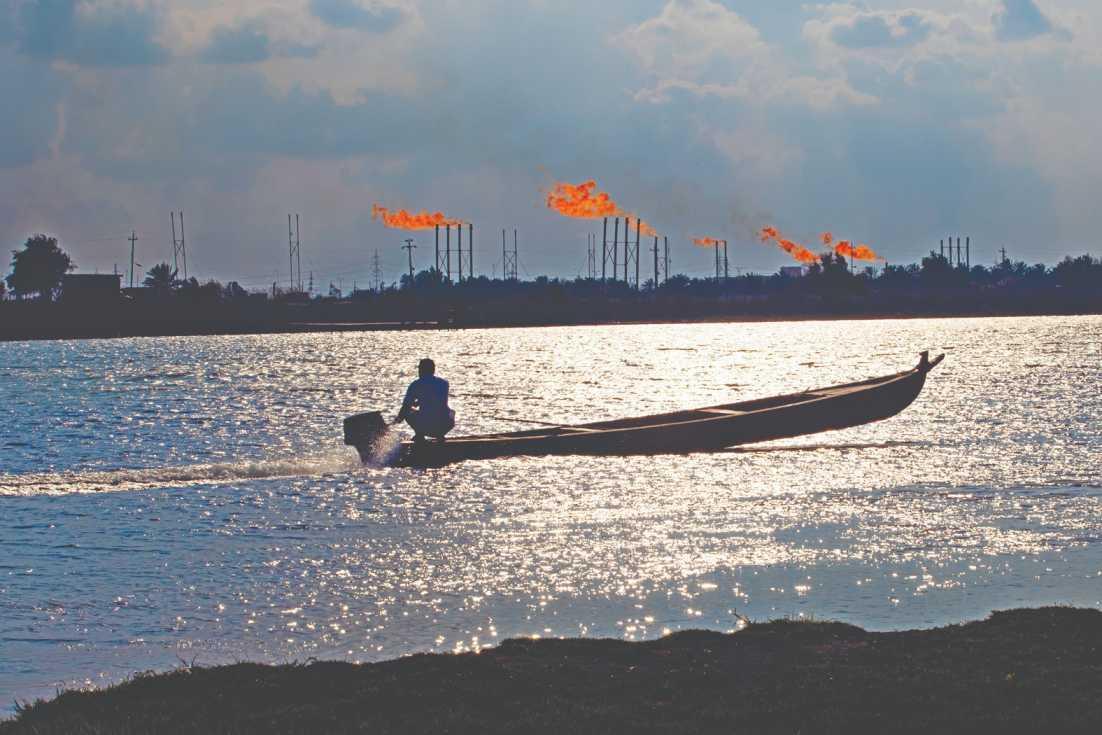
The oil is pumped 24 hours a day several meters from Raghed Jasim’s home in Iraq’s crude-rich southern heartland. Gas flares from the field light the night sky bright orange, spewing acrid smoke; when the wind picks up, the 40-year old’s clothes are coated black.
For Iraq’s poorest, evidence of the country’s monumental oil wealth is inescapable. So is the knowledge that very little of it trickles down to them.
Jasim’s savings were depleted when he was diagnosed with cancer last year, a disease he is convinced was caused by the toxic plumes. Twenty years since the U.S.-led invasion toppled Saddam Hussein and remade Iraq’s political order with the promise of democracy and freedom, he has one wish: To find a way to leave.
“There is no future here for my children,” he said.
Basra province, which boasts most of Iraq’s oil reserves, is symbolic of the deep disparities that have endured since the 2003 invasion. Basra continually bewilders experts, envoys and residents: How can a relatively stable province so rich in resources rank among the poorest and most under-developed in the country?
“Of course, I blame the corrupt Iraqi government,” said Jasim, a policeman, echoing a widespread view in the region. “But I blame the Americans too. They replaced our leaders with thieves.”
Local leaders in Basra talk of the oil reserves as both a blessing and a curse. They say resources bring affluence but have also given rise to vicious competition between political elites and armed groups at the expense of the Iraqi people.
The power-sharing system in place since 2003, which divides the state and its institutions along ethnic and sectarian lines, sucks oil wealth into a pool of corruption and patronage. The higher the oil price, the more entrenched this system becomes as sectarian-based parties claim lucrative ministry portfolios, appoint loyalists in key positions and dole out public jobs to ensure support. According to the International Monetary Fund, public sector employment tripled from 2004 to 2013, but service delivery in health, education and power sectors remained inadequate.
The result is that elections keep establishment parties in power. Voter turnout has dropped to record lows.
The 2003 toppling of Saddam propelled the oil-rich country into the global economy, opening the doors to foreign investment. In pre-invasion planning, U.S. advisors and their Iraqi opposition allies in exile had envisioned a shock system of reforms that would revamp Iraq’s oil industry and fund post-war reconstruction.
Instead, violence hobbled oil production for years. A charm offensive by then-Oil Minister Hussein al-Shahrestani paved the way for major oil contracts to be awarded in 2007 and 2009. Today exports reach over 3 million barrels a day, double the rate in the early 2000s. The state budget, which in 2021 reached up to $90 billion, is financed almost entirely by oil revenues. Still, the government fails to deliver essential services, including water and electricity.
In Basra, conditions rank amongst the worst in the country. Unemployment stands at 21 percent, above the national average of 16 percent according to a 2022 study by the International Labor Organization. Statistics for poverty
rates vary from 10-20 percent according to various studies and local economists. Meanwhile, the province boasts around 70 percent of the country’s oil production capacity.